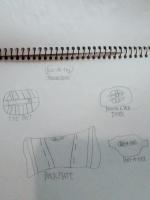How A Nondisclosure Agreement Can Protect Your Idea From Invention Thieves.
A nondisclosure agreement, commonly called an NDA, is an indispensable part of a successful inventors tool kit. Used properly an NDA will allow you to speak freely about your invention to interested companies, manufacturers and service providers.
To make your invention successful you must be able to evaluate it. To evaluate effectively it is important to discuss your invention in a candid way with the people that can give you the feedback you need. An NDA allows you to do this with the confidence that your idea is protected.
For a sample inventor's NDA click here >>
An NDA is a document stating that confidential information that you disclose about your invention must remain confidential. The term of most NDA's is from 1 to 5 years. Any term beyond five years could be considered unreasonable and possibly invalidate the agreement. Consult your attorney for legal advise. The typical term that I have found to be most common is two years. This should give you enough time to determine if you want to file a patent on your invention but is also fair to the party you are disclosing your invention to.
An NDA can be an effective tool when you are trying to license your invention. When you are approaching a company that you feel is a good fit for your product always ask them to sign and NDA. Many companies will want you to use their standard NDA. Some times this is OK and their version will give you enough protection. Beware though, sometimes using someone else's NDA will eliminate any protection that you would otherwise be getting. I have seen NDA's that were completely one sided. Some of these are not truly nondisclosure agreements. These documents are used to limit the companies liability, so make sure to read it carefully.
Sometimes companies will refuse to sign an nondisclosure agreement. This does not necessarily mean they want to steal your idea or take advantage of you. Many companies are worried about being sued by disgruntled inventors. Many times larger companies are working many different ideas that are at various stages of development. The concern is that an inventor will bring them an idea they are currently working on. When the company brings the product to market the inventor might think they have had their idea stolen. If the inventor sues, the company may be at the mercy of a sympathetic jury. This is not a position any company wants to be in whether they are guilty or not.
So what do you do if a company does not want to sign an NDA agreement? The decision is yours and the situation will dictate what you end up doing. In many cases if the company has a good reputation and they are a good fit for your idea, go to see them anyways. It is oftentimes worth the risk.
Return to Invention Submission from Nondisclosure Agreement
Return to Home Page from Nondisclosure Agreement
Recent Articles
-
Don't Dare Underwear
Jun 19, 24 11:03 AM
I created a new concept of the boxer briefs with the pocket. They are specifically designed to carry a condom. Joining the fight against infectious diseases -
Rol-A-Flex: Platinum Edition
Apr 08, 24 11:24 AM
Hi My Name Is Malcolm Washington, I'm 19 Years Old And My Invention Is A New And Important Rol-A-Flex AB Belt Called Rol-A-Flex Platinum Edition, It's -
SENSE AWARE
Mar 26, 24 08:00 AM
Sense Aware represents the latest assistive technology project designed to improve safety and independence for the disabled. At its core is the Arduino

